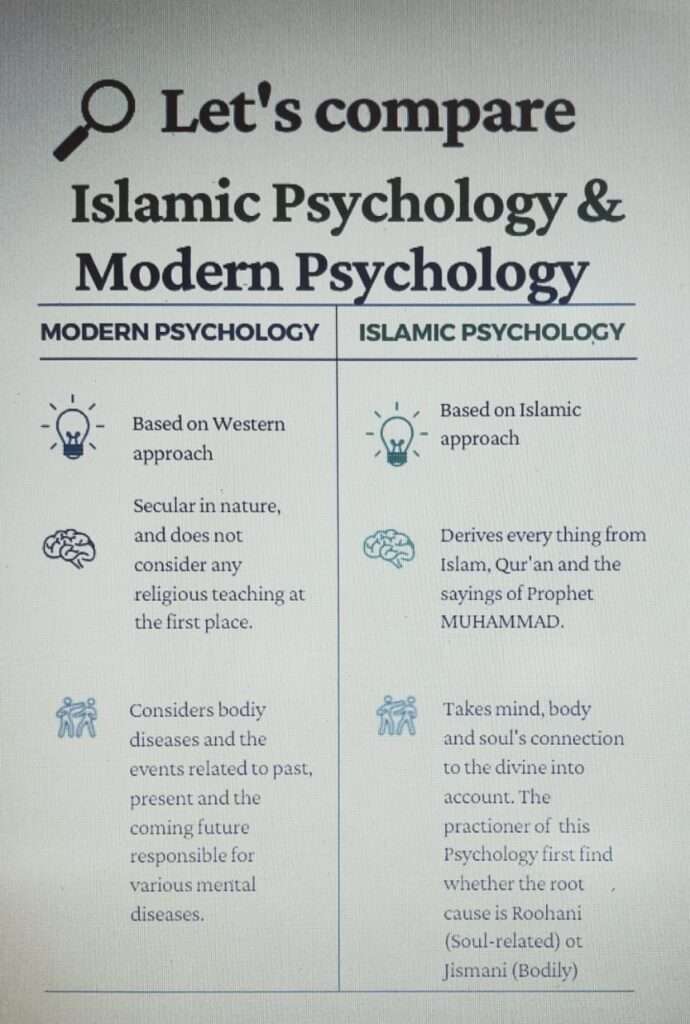Table of Contents
ToggleINTRODUCTION
Islamic Psychology has been an important aspect for Muslim world from the times of Prophet Muhammad (S.A.W.) and Sahaba. From Greeks to Babylonians, from Judaism and Christianity to Islam, Psychology as a subject and mind-sciences has evolved from time to time. During the Golden Era of Islam, various Islamic Sciences flourished and Islamic Psychology was also one of them. The major Muslim pioneers in the subject during the Golden period were Al-Kindi (803-873), Abu Zayd Al-Balkhi (850-934 AD), Al-Farabi (872-950 AD), Ibn Sina (980-1037 AD)), and Imam Ghazali (1058-1111 AD).
After Islamic Empire started to fall at various places (especially during the mid 19th and 20th centuries), Modern Psychology dominated the whole world and currently, Modern Psychology all over the world is widely studied and been evolving, unlike Islamic Psychology. The growth and further research in Islamic Psychology have been suppressed, and the world is now being dominated by the Modern aspect of Psychology.
DIFFERENCE BETWEEN VIEWPOINTS OF ISLAMIC PSYCHOLOGY AND MODERN PSYCHOLOGY
The differences between Islamic and Modern Psychology are large. The viewpoints of both Psychologies differ, however, if proper analysis is done, one may find that Islamic Psychology covers almost all the important aspects that are studied in Modern Psychology. Even the new researches done by various Islamic Psychologists is backed up by the Modern Psychologists of today.
Islamic Psychology is the combined approach that considers mind, body, and soul at the same time. Islamic Psychology focuses more on the heart and the connection of the soul to the divine, unlike modern Psychology that aims to put self before God first. (What is Islamic Psychology?. (2021)). Islamic Psychology is the science that completely agrees with the teachings of the Qur’an and the teachings of Prophet Muhammad. (What is Islamic Psychology?. (2021)). The mental patient suffering from depression, anxiety, and fear will be treated differently through the Islamic approach of Psychology, while the same patients suffering from the above mental issues will be treated in a completely different manner by modern Psychologists. In short, modern Psychologists rather focusses more on treating the patients without looking at the root cause of the problem. They consider all the mind-related issues to be the ones that generate from the issues inside the body and the nearby surroundings. However, Islamic Psychology looks deep in finding the root cause of problems that may associate particularly with the soul first. If the soul does not come out to be the major problem for the patient, then it considers other aspects related to the body.

EXAMPLES TO ILLUSTRATE DIFFERENCES BETWEEN BOTH THE PSYCHOLOGIES
- A person suffering from the problem of depression and anxiety visits a psychologist. First, he visits a non-Muslim Psychologist. The non-Muslim Psychologist will find the root cause of the problem by asking him various questions related to the past. Then after analyzing his past and current problems he is facing, the non-Muslim Psychologist will offer him some medicines to eat and offer him timely counseling to take him out of depression. A Muslim Psychologist and the practitioner of Islamic Psychology will treat the same patient with a different approach. Islamic Psychologist will just like the non-Muslim Psychologist listen to the past and current problems of the patient. After analyzing the complete cause of problems, the practitioner of Islamic Psychology will first identify whether the problem is Roohani (Spiritual) or Jismani (Bodily). (What is Islamic Psychology?. (2021)). Imam Al Balkhi in his various famous works stated that the soul and the body are interlinked together. According to him, “If the body gets imbalanced, it may result in Fever, Headaches, and other physical illness, and if the soul gets disturbed, then many mental diseases and other emotional diseases like Anger, depression, anxiety is formed.” (Pavlova & Vakhidov, 2019) Thus, if the problem is Roohani, then the Islamic Psychologist will give the patients some Wazifas and Adhkars to recite, along with some simple daily tasks and periodical counseling. However, if the problem is Jismani (bodily) and due to the diseases in the body, the mind has been affected, then the Muslim Psychologist will offer the medicines according to the Hikmat (Islamic Medical Practice) that will remove the diseases from his body and recover the person.
- Let us look at another example. A person is suffering from a split personality disorder. In different instants, the person behaves differently than what he actually is. Sometimes the person suffering shows three to four personalities at different times. Saltzman, C. (2008). The Non-Muslim Psychologists will not be able to completely treat the patient, as there is no actual root cause found for such a thing. The Non-Muslim Psychologist will give some medicines and offer the patient timely counseling to get rid of the disease. In a true sense, non-Muslim psychology will face difficulty to treat the patient. However, in the past, split personality disorder was well treated by Islamic Psychologists, and is still treated by Islamic Psychology practitioners well. As stated, Islamic Psychology first searches for the problems inside the soul and the connection to the divine. (What is Islamic Psychology?. (2021)). The Islamic Psychologists will first determine whether the person’s disease is bodily, or the person is possessed by some evil spirit. If the person is possessed with some evil spirit, then the Ruqyah (Exorcism) along with other medications will be done to recover the patient from Illness. However, if the person is just making lame excuses for split personality disorders to achieve some goal/mission, then the Islamic Psychologists will offer them simple counseling and little medications.
- Let us take another example to better understand the difference between both Psychologies. Jameel is a young boy with a good intellect. He treats all his friends and relatives well. He is a happy, religious and satisfied person. However, for the past few months, Jameel is getting angry about little things. He has tried to commit suicide multiple times in a week. Three days before, he got involved in a brutal fight with his friends. Jameel was seriously wounded and the parents of Jameel became a little worried. He took Jameel to a practitioner of Modern Psychology. He asked some questions about Jameel’s past, and about the current events. The Psychologist gave some medicines to Jameel and asked him to come every Saturday for a counseling session. However, this did not result in any serious recovery of Jameel. Then, Jameel’s parents took him to the Islamic Psychologist. Islamic Psychologist tried to first read the current condition of the soul of Jameel and its connection to the divine. He asked him various questions and found that Jameel’s current condition is due to the failure in recent exams. Jameel has not been able to come out of depression resulted due to the failure in Exams. This also badly affected the soul of Jameel. Since, mind, soul, and body are connected. Jameel’s mental suffering was Roohani (Spiritual). Due to the Roohani (Spiritual) perspective of problem, Jameel tried to commit suicide many times. The doctor advised Jameel’s parents to make him sit in various Qur’anic sermons thrice in a week. Also, the psychologist told Jameel that the problems, failure, and sufferings are part of life and a trial from ALLAH (S.W.T.). This was the reason for Jameel’s sudden anger, depression, and changed behavior. The parents did what the Islamic practitioner of Psychology asked him to do, and Jameel within two months became normal again. Jameel did not require any medicines to come out of this condition. Rather, since soul and body are linked, this problem occurred. (Pavlova & Vakhidov, 2019) It was the problem of soul and the loss of connection with the divine that changed Jameel.
CONCLUSION
The gap between the thinking process, methods, and ways of both the psychologies are different. The Islamic approach depends mainly upon the Qur’an and the teaching of the Prophets. Islamic Psychology is based on the belief that GOD (ALLAH) is the only one who heals and submits itself towards GOD. While Western (Modern) Psychology is secular and does not consider soul in the first place. Islamic Psychology bloomed during the Golden Era of Islam. Nowadays, Western (Modern) psychology is dominating. Even Muslims around the Globe are studying Modern Psychology and treating patients through the modern approach. The practitioners of Islamic Psychology are rare, and the study of Islamic Psychology is now limited to several Madrasas and some Universities.
REFERENCES
- What is Islamic Psychology?. (2021). Retrieved 1 December 2021, from https://www.islamicpsychology.org/what-is-islamic-psychology
- Pavlova, O., & Vakhidov, A. (2019). Sustenance of the Soul: The Cognitive Behavior Therapy of A Ninth Century PhysicianPaperback: Review of Abu Zayed al-Balkhi’s book «Food for the Soul». Minbar. Islamic Studies, 12(3), 871-880. doi: 10.31162/2618-9569-2019-12-3-871-880
- Saltzman, C. (2008). Disorders of the self: a personality-guided approach. Psychodynamic Practice, 14(1), 103-108. doi: 10.1080/14753630701747788
Read More:
DUA FOR WITR: ELEVATE YOUR WITR SALAH – Islamic Hikayatein
Unrevealing The Powerful Wisdom Behind Circumcision In Islam – Islamic Hikayatein














